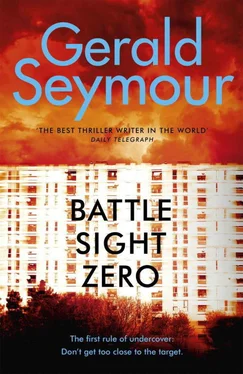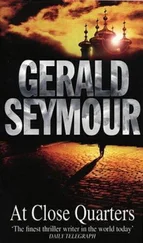Gough said, ‘You get into a comfort zone. You think you know what you’re at, and what’s the prospect for the next day and the next week. Start to relax. You don’t really know who you’re dealing with and what the stakes are, and where it’s taking you. Never been any different, but still gives you a jolt.’
‘Quite a big jolt, Gough, and one that sends a message.’
‘I think I am aware of that, the staying safe bit.’
‘This is just a fucking horrible place, Gough.’
Which it was. Farther down from where the people in the frogmen gear were going into the water, was an island of snagged plastic bin bags, and around them were supermarket trolleys. He thought it would have taken some expert navigation from the canal cruiser people to have come through the blockages. Gough had only met little Tommy the Tout the once, no names and no introductions, and in the hour before he’d watched through a one-way mirror as the kid was given his marching orders by the Counter Terrorist detectives. Eager, anxious to please, not what Gough liked to see. He had felt little confidence but had not the clout to get the kid pulled back. They were seldom straightforward…
Investigations tended to have various masters, and most times he just hoped they’d not snag each other like crossed over fishing lines – not that there would be much in this polluted waterway for anglers. A heron flew past, languid and ignoring them and moving away from them with a silent wing beat.
‘What do you reckon?’
She answered him, ‘I reckon we get the fuck out, and the word is it’s all narcotics and vendettas.’
He’d leave that to her… It might have been wind in the branches above the towpath, and it might have been a glob of water that fell from a dead leaf and landed on his shoulder. Gough was an old stager, had been around too long in the company of sudden death. He flicked irritably at his coat. One good memory, when he had been raw and on the steep learning curve, and the threat was from the Irish and not these home-grown jihadis. His first attachment to the Branch in Belfast, and there had been an ‘own goal’ call out for a bit of old oak woodland near to Dungannon in the Tyrone rolling country. The device had exploded as the courier carried it from the hide among the trees, down a path and towards his vehicle on the Armagh road. Something had landed on Gough’s shoulder and he had flicked at it, and seen it fall to the ground and it still showed a bright pinkish colour. A piece of gristle, or might have been ligament. He’d looked up. Caught among the branches were small body parts. A couple of the local Branch boys had watched him, looked for a reaction to prove that a newcomer from ‘over the water’ was soft. He’d ignored it, the bit of meat that landed on him, had given them no satisfaction: it was a long time, a big part of Gough’s life, that he had been checking out premature killings. He had not been ‘soft’ then, but years had rolled, and now he cared more about the people who worked for him, not those they tracked. He was an old warrior, and roughened by the times, and had seen pretty much everything and had all the T-shirts folded away in a wardrobe drawer, had been everywhere that the kids regarded as a battlefield. But he cared more now about his own, owed it to them.
She had no authority. Pegs was a bottle-washer in his office. She had no rank, but instead of status had a personality that was difficult to deny. She was lecturing. ‘As you know, offered himself up, but we rated him as a fantasist. Not on our payroll. Best to let it be known, if anything needs shoving into the local news-sheet, he was caught up in a little bit of turf war between druggie groups. Why are we here if he was of no value to us – just happened to be in the area, other business… what I’ve given you would be a good line to follow. Nice to have met you boys.’
He thought she’d bought time. Did not need much of it, more than a week, less than a fortnight, and the pace had picked up. They had come up fast, leaving London before dawn, and some of the way they’d had a bike out in front of them and clearing the way. She’d drive back, and slower. They settled in their seats.
Gough said, ‘A death makes it a serious business. He was lucky to have died before they did the heavy work on him. I think we’d have had the alarms by now if he’d known anything, if he talked. I’d put it down to him pushing too fast, gone careless. We’re not just talking about pissing off for a weekend and leaving the tomatoes in the greenhouse with no water. If they’ll kill then they’re close enough to kicking off… What do they want, Pegs, want most?’
She’d left the canal behind her. ‘Same as what they always want – what makes a big noise, big shout, a big bang. What else?’
October 1956
Upper windows were open and milk bottles cascaded down from them.
They smashed on the upper armour of a tank and on the cobbles of the street. The bottles held no milk but had been filled with clear liquid – petrol fuel – and in the bottles’ necks were stuffed rags, already lit. The conscript, holding his rifle across his chest, and petrified, was 30 or 40 metres behind the tank, but his sergeant – leading them – was close. The fuel made spears of orange fire as it scattered with the flying glass shards, and came too fast for a man to avoid. The sergeant was engulfed. The conscript watched, rooted. The NCO, hated by the conscript and many others of this platoon, screamed in pain. None of the young soldiers hurried forward to help him. They would have seen his face and the agony of it, and he would have sucked air down into his lungs and drawn the flames into his throat, deep into his chest tissue, and skin from his face would soon start to peel, and his uniform caught and made him a torch before his legs gave under him. Soon, the spasms became rarer, and in moments the body was still. Another man was on fire in the hatch of the tank and then he was ejected from the turret, chucked out because he blocked the escape of the crew, the gunner and the driver.
An officer, pistol drawn, tried to rally them. They had been told the day before, by women in the crowds, that the bottles filled with petrol and with a lit fuse were known among the Budapest people as ‘Molotov Cocktails’, named after their own foreign minister in Moscow. The conscript did not understand: yesterday they had fought against the townspeople of a friendly Socialist ally, who should have garlanded them with flowers; instead they had tried to kill them, and brutally. Much that he did not understand: a week before they had set out by train from their barracks in eastern Ukraine and then the commissars had lectured them that there had been an act of aggression from the Fascists of the North Atlantic Treaty nations, and that they would be coming to the help of comrades and friends. He had not yet fired his rifle, the weapon that had the thin chip in the stock, and that carried as its last five digits the serial number of 16751. Nothing had prepared the conscript for the reality of combat. They had formed up at the far end of a long street, and advanced behind three tanks, and had been told that their target was the headquarters of the ‘criminal gangs’ who had taken refuge close to a cinema. The street had become narrower and the first tank had been disabled, and there was firing from side streets… The first tank had most likely suffered engine failure, the second was attacked by a swarming mass of men. The crowd that clambered up on the superstructure had then tipped gasoline through every opening or vent, they could locate. Even against the noise of explosions and the revving of the engine, the conscript could hear the screams of these condemned men. They had practised infantry manoeuvre in support of armour and had been praised for their dedication, and had imagined themselves a formidable army, and had known nothing. It was a harsh lesson confronting them, and they were far from home.
Читать дальше












